Although most Civil War soldiers were between 18 and 39 years old, many young children also fought in the war.
It is estimated that at least 100,000 Union soldiers were boys under 15 years old and about 20 percent of all Civil War soldiers were under 18.
Since soldiers had to be at least 18 years old to enlist in the military, many of these boys lied about their age in order to join.
Other times, especially as the casualties climbed and more soldiers were needed, recruiters looked the other way when underage boys signed up.
Coincidentally, it was this abundance of young, boyish-looking men in the ranks that made it easier for young women to disguise themselves as men and also sign up as soldiers.
These boy soldiers usually served as drummer boys, musicians, messengers, nurses and scouts for the troops. Yet, during the heat of battle, many of these boys put these duties aside and joined the troops in combat.
One such soldier was Johnny Clem, an 11 year-old drummer boy for the Union army. Johnny became a celebrity during the battle of Chickamauga when he picked up a gun and shot a Confederate officer after he demanded Johnny to surrender. The army later promoted Johnny to sergeant and awarded him a silver medal.
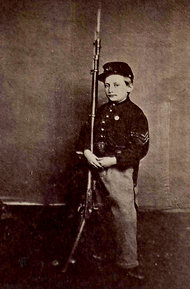
Johnny Clem
Johnny eventually earned the nickname “Drummer Boy of Chickamauga” or “Johnny Shiloh.” He was also commissioned by President Ulysses S. Grant as a second-lieutenant in 1871. Johnny was the last Civil War soldier still actively serving in the army when he retired, as Brigadier-General, in 1915.
Another such soldier was John Cook, a 15-year-old Union bugle player, who put down his instrument and volunteered to operate a cannon during the famous battle of Antietam. Cook later received the Medal of Honor for his actions during the battle.
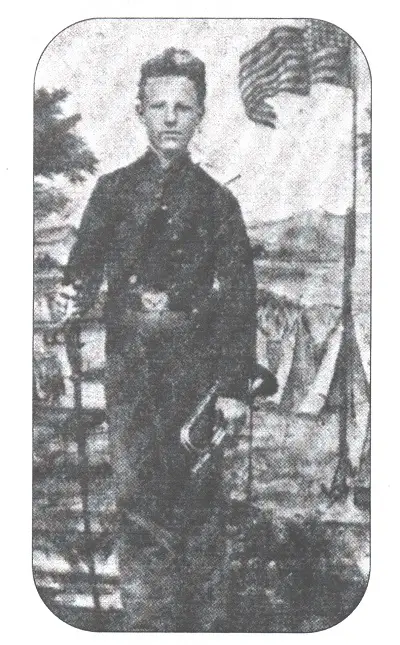
John Cook, a 15-year-old Union bugler who earned the Medal of Honor during the Battle of Antietam
The youngest Union soldier and the youngest soldier to fight in the Civil War was a boy named Edward Black. Edward was born on May 30 in 1853, making him just 8 years old when he joined the Union army on July 24, 1861 as a drummer boy for the 21st Indiana volunteers. He is also considered one of the youngest soldiers ever to serve in the history of the U.S. Army.
Black was captured at the Battle of Baton Rouge in August of 1862 but was freed when the Union army won the battle. After the army discharged him in September of 1862, Edward reenlisted with 1st Indiana Volunteer Heavy Artillery in February 1863. He continued fighting until the end of the war and was honorable discharged in February of 1866.
According to the book, The Fighting Men of the Civil War, the youngest Confederate soldier was probably a boy named Charles C. Hay who joined the Alabama regiment when he was eleven years old.
The youngest soldier injured during the war was a boy named William Black, who was just 12 years old when his left hand and arm were shattered by an exploding shell.
The youngest recruits often served as musicians and drummers, yet this did not prevent them from being wounded or injured like Orion Howe, a 14 year-old drummer who was severely wounded when he volunteered to retrieve some much-needed ammunition for Colonel Malmborg from General Sherman during the battle of Vicksburg.
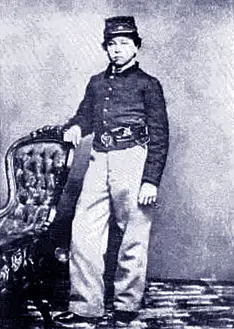
Orion Perseus Howe, 14-year-old drummer boy and Medal of Honor recipient, circa 1863
His regiment’s historian wrote an account of Howe’s deed, which was published in the book Sherman: Fighting Prophet:
“We could see him nearly all the way…he ran through what seemed a hailstorm of canister and musket-balls, each throwing up its little puff of dust when it struck the dry hillside. Suddenly he dropped and hearts sank, but he had only tripped. Often he stumbled, sometimes he fell prostrate, but was quickly up again and he finally disappeared from us, limping over the summit and the 55th saw him no more for several months.”
Howe later received the Medal of Honor for his actions and Abraham Lincoln appointed him to the United States Naval Academy in July of 1865.
Many of these children joined the army because they were either runaways, orphans or they wanted to fight alongside their brothers and fathers.
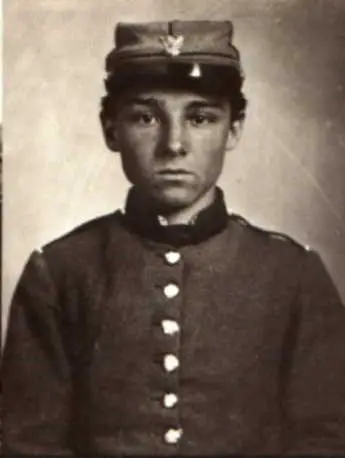
Private Edwin Francis Jemison
Although they held romantic and heroic notions of war, it wasn’t long until they experienced the full horrors of war. One boy from Wisconsin, Elisha Stockwell, described his experience during the battle of Shiloh in 1862:
“I want to say, as we lay there and the shells were flying over us, my thoughts went back to my home, and I thought what a foolish boy I was to run away and get into such a mess as I was in. I would have been glad to have seen my father coming after me.”
Another boy, 16-year-old John A. Cockerhill, also described his experience at Shiloh:
“I passed… the corpse of a beautiful boy in gray who lay with his blond curls scattered about his face and his hand folded peacefully across his breast. He was clad in a bright and neat uniform, well garnished with gold, which seemed to tell the story of a loving mother and sisters who had sent their household pet to the field of war. His neat little hat lying beside him bore the number of a Georgia regiment… He was about my age… At the sight of the poor boy’s corpse, I burst into a regular boo hoo and started on.”
Although young children, these boys served their country with as much bravery and dedication as any of the full grown men they fought alongside.
About 48 young boys under age 18 won the Congressional Medal of Honor for their bravery during battle and many continued to serve in the army long after the war ended.
Sources:
Fighting Men of the Civil War; William C. Davis; Russ A. Pritchard; 1989
Soldiers Blue and Gray; James I. Robertson; 1998
Boy Soldiers of the Confederacy; Susan R. Hull; 1905
Children of the Civil War; Candice F. Ransom; 1998
Sherman: Fighting Prophet; Lloyd Lewis; 1993
PBS: Kids in the Civil War: http://www.pbs.org/wgbh/americanexperience/features/general-article/grant-kids/
New York Times; The Boys of War; Cate Lineberry, October 2011: http://opinionator.blogs.nytimes.com/2011/10/04/the-boys-of-war/

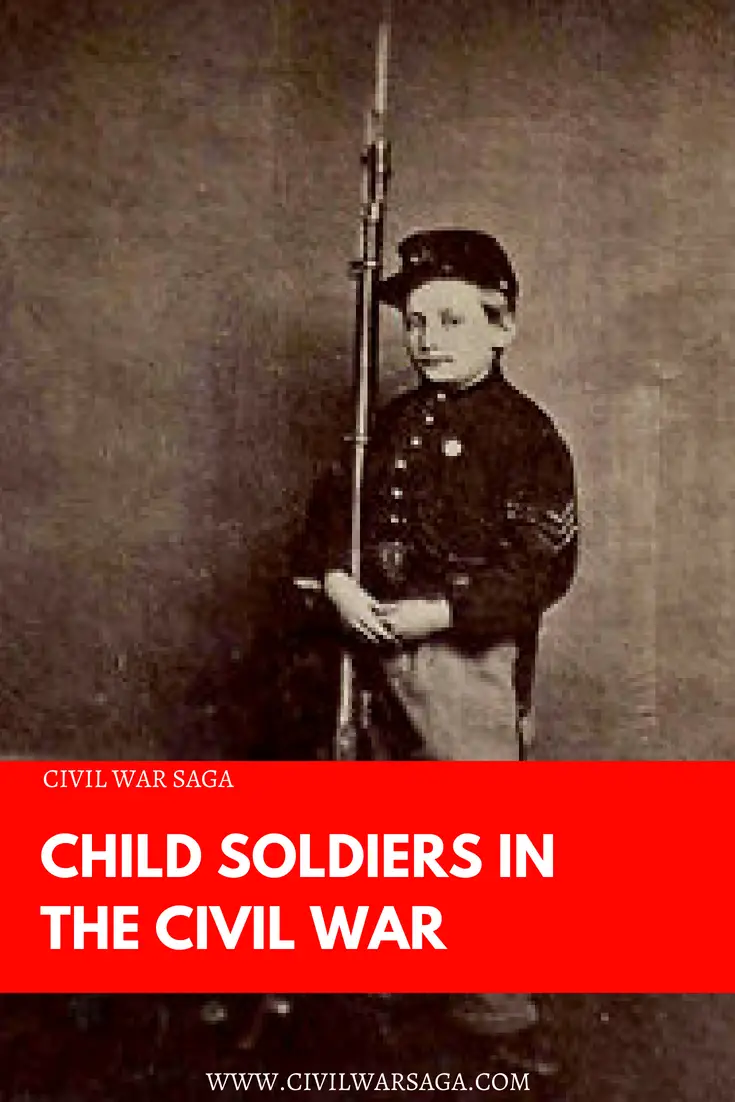
If a mustered in soldier was “canceled by red line” and removed from the muster roll, could or does this mean he is underage? This soldier I am asking about was mustered in on one day and removed from the muster roll the next day by reason stated “canceled by red line”. He was seventeen at that time!
Thank you
Frank Butler
62nd Co. D Pa. Vol.
Hi Frank, I don’t know the official answer to your question but in my opinion, I kind of doubt it. The army was desperate for soldiers and usually just ignored the fact that many of the soldiers were underage. But it is a possibility though.
The youngest Confederate soldier was a boy named Charles C. Hay? No, Please check the rolls of 45th Virginia Infantry, Co. G. Alex “Gillenwaters” as it says in the rolls, but it should say “Gillenwater” marking him as an individual and not as a clan of people. Alex,I believe the youngest Confederate soldier or any soldier for that matter. He was age 7,from Tazewell,Va. Alex,was one of the original “Tazewell Boys” before being moved on to Co. G of the 45th. He enlisted on May 29th 1861 at Wytheville and served the duration of the war..
My Great-grandfather was the youngest soldier to be discharged at the end of the Civil war. He was 13 years old,and the only 13 year old soldier at the end of the Civil War. I have the documents from the US archives.
Andrew Jackson Botts enlisted as Jackson Botts,but was another Confederate who wasn’t recognized by the North.He was given a medal of honor from his comrades of the South.
That’s Awesome to hear. I’m in the process of doing some family tree research myself. Sadly too many people in my family had the same name which is where it gets confusing, plus if you add divorces, re-marriages, cheating affair births, out of wedlock births, Name changes, etc….It’s a total nightmare, and I’m just beginning.
To Andrew Botts. I am making a list of all the persons said to be the youngest civil war soldier. I would appreciate if you could send information about Andrew Jackson Botts to magolding22gmail.com and/or point me to websites with information about him. Thank you.
http://www.acrossthevalleytodarkness.com/blog/ I collect photographs and biographies of the boys who served during the Civil War and add them to the blog postings and to my presentations about these boys to school groups, civic organizations, libraries, and more. I would be interested in Alex’s story as well as Jackson Botts and any others readers of these comments would care to share. I can be reached by way of this website and will gladly share whatever I have collected with interested readers.
I am making a list of persons who were called the youngest solider in the Civil War and Alex Gillenwaters is clearly one of the alleged youngest who were claimed to be the youngest soldier. I would be grateful if you could email me at [email protected] with info such as the birth and death, enlistment and discharge, dates of Alex Gillenwaters or point me to a source I can check.
If this isn’t worth a few tears I don’t know what is.
I read alot that Union, and Confederate Armys had underage soldiers. According to the Bible Mary and Joseph were tasked with raising Baby Jesus at ages 13 and 15. Then I look at todays USA in the year 2015, and realize The Age Discrimination Act only covers people over 40 years of age, but it does not protect anyone under 18 years of age. I’m currently 28 years old. When I was 10 years old, all I wanted to do was quit school, get a full time job with decent pay, so I could get my first place away from home at 18 years of age. Here I am at 28 years of age, working a full-time job, and still living with my stupid mother. A 40 hour work week has not paid anybody enough to live on since the 1940’s. I make just under $11/hr, and 40 hours to me is considered part time. When you are taking a break every 2 house, no work gets done. I wish Full-time status was 60-70 hours a week, because 40 hours a week, wont even let me get a cheap apartment for my son and me. “As the Minimum Wage Increases, the Cost of Living also Increases” When is our US Government gonna pull it’s head out of it’s butt and set the cost of living below minimum wage where it belongs? If we don’t do something soon, WE will be the 3rd world country begging others for help fighting our oppressive Gov’t..
My Great Grandfather Thomas Vance was enlisted at the age of 15. Just barely 15 the family story is he wrote the number 16 on a piece of paper, put it in his shoe and when ask if he was over 16 said yes and was enlisted. He was wounded and recovered, He served all 3 years of his enlistment in the 69th Ohio, OVI, company I. Discharged in April 1865, You can read 11 of his letters home written during the Civil War that I sent to the Bowling Green University’s Civil war Project by going to the Bowling Green website and typing in a search of Thomas Vance. Called “the Thomas Vance” papers
My Great Uncle Ezekiel Smith went to war with his father my Great Great Grandfather at age 16 in a Colorado Artillery unit as an assistant to his father who was enlisted as a Wagon master. Ezekiel served out his enlistment and went on to become and Indian Fighter in the old west.
Was it common for boys to serve for other men in the Civil War. This person served in A Company 91 Ohio Inf.
from Aug23, 1863 to June 24, 1865. At the age of 15-16. His name was Adries Day Walters but he served according the pension records that his widow collected under the name of Aries D Coy.
Bobbi:
I can’t say if it was common but it probably did happen because if drafted a man with a family, farm or business to tend could literally have a substitute take thier place. This often occured with Irish immigrants and younger men or boys with little immediate prospects. Offering to be a draft substitute won the person a few hundred dollars so these people were typically poor and motivated by the money, thus in effect making them mercenary soldiers.
My great great grandfather William Allen served in Co. C 57th PA Volunteers as a private Sept. 15,1861 – Aug. 20, 1963. In 1860 he was an apprentice in Towanda PA. He was 14 or 15 when he enlisted (we don’t know his birthday but the year of his birth was 1846). He may have been a musician and was reported missing at Chancellorsville. He survived the war to have 6 children with his Irish wife Mary Hurley settling in the Towanda PA area. William was the great grandson of Jesse Allen b. 1754 Morristown NJ who served under Generals Montgomery and Clinton in the French and Indian wars and in the Continental Army NY and CT Regiment in the War of Independence 1777 and was present at surrender at Yorkstown by Cornwallis. Jesse was the cousin of Ethan Allen of the Green Mountain Boys.
The year should be 1863 not 1963.
How can I find out the age of the enlisted? On the records I find, just the year(s) served is published. I’m trying to figure out if it was son or the father’s records because the names are the same/similar.
Thanks!
I have been told that my great great grandfather-William I Shelton from KY, was a mill boy in the Confederate army. I have not been able to find any information as to what a mill boy was. Any information would be appreciated
How possible is it that a 15 year old drummer boy is absent from a regiments muster roll? My g-g-grandfather’s obituary mentions 2 enlistments. I’ve successfully found info on his second enlistment, but the first as a 15 year old drummer boy for the Vermont 3rd Infantry, Co E is stumping me. My request for his service records from the National Archives of this enlistment turn up nothing. Nor can I find his name on the muster rolls that I’ve found on line. Any tips on how I might find info about a 15 year old volunteer?
My great-grandfather, Nicholas Caffrey, served as a drummer boy from New York, age 12. However, I cannot find him on any roster. I believe he went in under a false name. There is someone named N. Calfin with no rank on the 61st NY infantry roster from the Civil War database, but nowhere does he show up in Ancestry.com. How can I find out if this might be my great-grandfather?
You would need to find the military records of the N. Calfin individual to help you confirm whether it is him. It is possible his records have been destroyed or lost or perhaps just not digitized yet. Since the records are not on ancestry.com it might take some digging to find them, if they exist. My only advice is just to scour every corner of the internet, every library, every database etc to find it but also know that it just might not happen. You could also hire a professional genealogist to find him in the records, if you are really determined.
this was very helpful
https://www.ancestry.com/mediaui-viewer/collection/1030/tree/53994018/person/222011983195/media/1c1d5300-8504-4167-9433-13b396b428a9?_phsrc=wbY51&usePUBJs=true
This is a supposed record of a claim that my 3rd great uncle enlisted at age 13 in the 25th Georgia Regiment (Company E) during the Civil War. It is proven only by testimony by a T. A. Gamble that says he served with him. He was approved for a pension by the County of Calhoun in Florida – which passed on to his wife. He was 85 at the time & his wife lived until 91 & died in 1943. I wonder why he waited so long to claim this, & him having died within the year, I feel he was getting sick & needed money for her. He had owned his own home, lost or sold it during his life, ran his own farming business, & by late life was renting that farming business. I can only assume it was an attempt to keep providing for his wife after death. Some of these claims might be proven by papers such as these &/or testimonies, but actually false.
I found what you posted very insightful. I am dealing with a similar issue with my great-great grandfather. I have been told for years that he enlisted at 16 in the 29th Georgia Infantry Regiment. But when I located his pension papers, he stated that he enlisted at 18 and served about 2 yrs before being shot through the mouth smashing all of his front teeth out. He had a witness who swore that he was with him when he enlisted and was later wounded. The pension papers were initially rejected because it was found that there was no proof that either of the two had served in that particular regiment. The papers were resubmitted with a letter stating that the witness had already been approved for his pension and was proven to have served. My g-g grandfather finally was approved. The problem is, that a book was published by a man who served in the same regiment and became its historian after the war. He has my g-g grandfather down as having enlisted in 1861 at the age of 16, not 1863 at 18. I can’t figure out why my great-great grandfather did not state that. Would it have affected him receiving a pension if he was underage when he joined?
Great article. I had read that not only didn’t they care if boys were under 18, they actually were so short of men that they kidnapped boys under 18 to serve. Is this true?
I’ve never heard of that happening so I’m not sure.
I find that this is very sad that children would die in war when they were young
R.I.P YOUNG PEOPLE OF THE CIVIL WAR I WILL FOREVER REMEMBER YOU THAT WAS A GREAT SACRIFICE.
Is their an estimate of how many people alive today that can say my grandfather fought in the Civil War?
My 2nd great grandfather was enlisted in the Union army at age 5. He was sent around to recruit others, according to the newspaper article I have (a scan of the clipping) he had a beautiful voice. I don’t know how to post a picture here or I would post it for you to see.
Hi there I read with great interest the stories of the boy soldiers on both sides of the Civil War. I’m trying to find out some information about my great grand father Patrick Mchugh who fought with the Louisiana 14th etc. He came from Ireland with his brother James around 1861 so he would have been 10 or 11 when joining up. I’ve searched most obvious records but so far no luck. He eventually migrated to Australia in 1877 on board the Sierra Nevada.
I’m wondering if you have come across either name in your research. Many thanks Debbie. Sydney Australia
Hi there. We stumbled on a headstone in Savannah, GA’s Hillcrest Abbey Cemetery that claims Whitemarsh H. MacFeeley was the youngest soldier of the confederacy. I’ve checked many records and articles online, and it seems there is conflicting information as to who the youngest person was, but I cannot find any records on MacFeeley. I shared a video of this memorial plaque, attached. Can you help?
This was a great article to be turned onto today if just because there is a headstone in Hillcrest Abbey East Cemetery in Savannah, Georgia within 100 yards of the Fort Brown earthenworks that states, “Youngest Solider of The Confederacy,” Whitemarsh H. MacFeeley. Past that there seems to be little information less some suggesting he was 9 years of age but nothing else really respective of his death, or how he garnered the title. There is also no corresponding headstone with a birthdate or deathdate less some online suggestion that he died at 9. My estimation is that this was installed in 1951 or within a few years of the plaque commemorating the Fort Brown related earthenworks remaining in the cemetery. Clearly the people who installed the memorial stone to him felt it was a worthy cause at whatever level but the greater story seems missing. Anyone out there with any insight would be greatly appreciated on our end here in Savannah! Thanks!